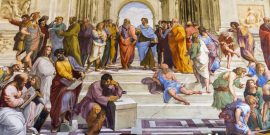It's not "woke" to restore worthy but neglected contributions to the great tradition.
The Socratic Statesman
For twenty-five years now, the Landmark Ancient Histories series has, in effect if not intention, operated by the principle, “We’ll make them an edition they can’t refuse.” Rival editions do admittedly retain distinctive strengths. Some offer stricter translations; others contain interpretive material from a discipline or school of thought favored by the reader. But each Landmark, aptly described not as mere translations but as “comprehensive guides,” becomes from its appearance indispensable to every kind of reader. Most famous for their detailed and frequent maps, Landmarks also boast outlines, timelines, archaeological and geographic photographs, diagrams, glossaries, and appendices—sometimes dozens of them—examining an array of relevant topics. Each appendix is written by a specialist, but readable to those who don’t know a helot from a hoplite. The maps alone make it almost inconceivable that someone like myself, teaching works in translation in a generalist curriculum, would ever assign a rival edition. At the same time, their wealth of supplemental materials earns Landmarks a place on the shelves of scholars and specialists.
Xenophon the Obscure
With the publication of The Landmark Anabasis, translated by David Thomas and edited by Thomas and Shane Brennan, Xenophon has won the distinction of being the first author to appear twice in the series. (Landmark published Xenophon’s Hellenika a continuation of Thucydides’ History of the Peloponnesian War, in 2010.) If a Landmark for the pseudo-historical Cyropaedia is in the works, he will appear a third time. In any case, it is unlikely that another author will appear even twice, as the ancient historians tended to pour themselves into a single magnum opus.
This might strike the non-specialist as strange. Most readers will have heard of Herodotus, Thucydides, and Caesar. If they do not know Arrian, they will at least know his subject, Alexander the Great. But Xenophon? He was once as well known as any ancient historian and moralist. Today he is obscure, even in the classical education movement, which prides itself on returning to the wellsprings of the West by reading Homer and Herodotus, Plato and Plutarch, Aeschylus and Aristotle. The Landmark Anabasis might spur a more general revival; certainly, it deserves a wider audience than academics in the immediately relevant disciplines (classics, ancient history, and military history). Classical educators, in particular, should restore the Anabasis to a place of pride in their curricula. The Anabasis is a true adventure story, which will attract and inspire young readers—especially young men. It can serve as a relatively accessible introduction to antiquity, while raising profound questions about politics, leadership, character and custom.
Who was Xenophon? Briefly, he was the other great Athenian to have studied with, and written about, Socrates. When Socrates was sentenced to death in the spring of 399 BC, Plato was at the trial. Xenophon was not. While Plato spent the final years of Socrates’ life with his teacher in Athens, Xenophon was shaking its dust from his sandals. Those two years—between spring 401 and spring 399—are the dramatic setting for nearly a third of Plato’s philosophical dialogues. For Xenophon, they were years of military adventure and political intrigue. These events became his Anabasis.
What an adventure it is! Xenophon’s friend Proxenos had invited him to accompany a mercenary expedition into Persia. Cyrus the Younger, brother to the Persian King, had gathered some twelve thousand Greek hoplites (heavy infantry soldiers), ostensibly to subdue a restive tribe ruled by the Persians. But Cyrus’s real goal was to use the superior Greek infantry to overthrow his brother and make himself king. The first book culminates in the Battle of Cunaxa, where the Greek forces rout the King’s forces in their sector of the battlefield, only to discover that the rest of Cyrus’s army is scattered, and Cyrus himself killed. By the end of Book 2, the Greek generals, attempting to negotiate a return home, have been deceived, captured, and killed by the Persians. Without its head, the enemy expects the body of the Greek army to die, probably soon.
Confronting the Impasse
Xenophon waits for this critical moment to give himself the introduction that, as the rest of the narrative will reveal, he deserves. As the Landmark editor Shane Brennan suggests, “The Xenophon portrayed in the text is primarily put forward as a model pupil of Socrates who applies the lessons of his teacher to the extreme situations he confronts.” Book 3 begins with the Greek soldiers in despair: “Since the generals had been arrested and those of the captains and ordinary soldiers who had followed along with them had perished, the Greeks were in very great perplexity.” Xenophon provides a vivid description of the obstacles they face and the fear that paralyzes them. They are surrounded by enemies, a thousand miles from home, without a guide, facing impassable rivers, and lacking the cavalry they would need to capitalize on any victory they might win against their enemy:
With these thoughts in their minds and with heavy hearts, few of them touched their meal for the evening and few kindled fires. Many did not come into the camp that night, each individual instead trying to take his rest where he happened to be. But they were unable to sleep because of their distress and longing for their native lands and their parents, wives, and children, whom they thought they would never see again. It was in this state of mind that they all tried to take their rest (3.1.3).
David Thomas’ translation rightly highlights the philosophical connotations of Xenophon’s narration. In this acutely practical crisis, Xenophon says the Greeks are in “a very great aporia,” an impasse or dilemma (aporos means “lacking a way” or “without means”). The term is familiar from Plato to denote an intellectual impasse: Plato’s shorter works are “aporetic” dialogues that end with Socrates and his interlocutors affirming only knowledge of their own ignorance. Where Rex Warner’s looser translation tells us that “the Greeks were in an extremely awkward position,” and Wayne Ambler’s literal translation tells us they were “very much at a loss,” Thomas’ “perplexity” reminds us of the philosophical sense of aporia. Immediately after this passage, Xenophon introduces himself and recalls his conversation with Socrates about joining the expedition.
We usually treat Socrates as the wellspring of our philosophic tradition, and trace that tradition down through Plato and Aristotle. Reading the Anabasis, one wonders if Xenophon should be considered a second stream in the Socratic tradition.
With this single word, Xenophon speaks—or at least suggests—volumes. While Plato was in the agora encountering philosophical impasses with Socrates, Xenophon was in the field, confronting—and overcoming—one life-or-death impasse after another. Each aporia can be overcome because Xenophon himself is not “without resources”—and knows it. Deeply stamped by both traditional Athenian education and his encounter with Socratic philosophy, Xenophon can assess the military, geographic, and rhetorical situations he encounters, and respond or reshape those situations realistically, flexibly, and confidently to secure his and the army’s benefit. With the commanders captured, and the army falling into listless despair, Xenophon wakes from a dream to realize that no one is coming to save them.
Why am I laying down? The night is far advanced, and it is likely that along with the day will come the enemy. If we fall into the hands of the King, what is to stop us from having to behold all the most grievous sights imaginable, from suffering all the most terrible torments, and from dying in the course of humiliating maltreatment? Nobody is making preparations or paying attention to how we may defend ourselves, but instead we are lying around as if it were possible to live in peace and quiet. Take me, for example: From what city am I expecting the general to come to take action here? What age am I waiting to reach? For I shall not grow any older if I hand myself over to the enemy today! (3.1.13–14).
Xenophon confidently steers between the hubris of the generals and the despair of the common soldiers. He assembles the captains, impresses upon them the necessity of organizing themselves, and inspires them with the prospect, not only of survival but of reaping the spoils of war. In an appeal that will become the backbone of his leadership, he encourages the captains to “perform noble deeds,” to “take the lead in rousing the others to reveal their worth,” and to “show yourselves to … deserve more to be generals than the generals themselves.” Xenophon reminds the common soldiers that freedom is their birthright, signified by the fact that, unlike the Persians, “you prostrate yourself before no human master but before the gods.” Xenophon’s example instructs the reader who finds himself at war—real or metaphoric; cold or hot; cultural, civil, or international—that one cannot “live in peace and quiet” on the enemy’s terms. Xenophon shows that a people with habits of open discussion, self-government, and discipline can preserve themselves from defeat.
Education in Leadership
The full title, The Anabasis of Cyrus, refers to Cyrus’s “ascent” or “march from the coast to the interior.” But only Book One describes these events; the remaining six books trace the circuitous route back to Greece via Armenia, the Black Sea, Byzantium, and Thrace. Nevertheless, the work as a whole is called The Anabasis of Cyrus, perhaps for two reasons. First, it is Cyrus’s expedition that initiates the adventure. The Greeks, who become known as the Ten Thousand, are famous in their own lifetimes as the soldiers who proved it was possible to march into the heart of Persia, bloody the King’s nose, and return home in defiance of the King’s minions—an indication of weakness that would be fully disclosed seventy years later by Alexander.
A second reason for the title might involve some Xenophontic wordplay. Cyrus’s name in Greek means “lord,” as Christians who pray “Kyrie, eleison” will recall. Kurou Anabaseōs, translated literally, is The Ascent of the Lord. And it is lordship—the art of rule—that Xenophon the character must master, and that Xenophon the author examines through the narrative. The Landmark contributors helpfully highlight this theme, which is especially prominent in Xenophon’s reflections on the generals at the end of Book 2. Teachers today would do well to draw upon the Anabasis, as well as Plutarch and Cicero, in developing a classical education in leadership.
We usually treat Socrates as the wellspring of our philosophic tradition and trace that tradition down through Plato and Aristotle. Reading the Anabasis, one wonders if Xenophon should be considered a second stream in the Socratic tradition. Plato and Aristotle both elevated the philosophic or contemplative life over the political or active life. But if we are, as Plato and Aristotle argued, necessarily and naturally political animals, then there must be some dignity to the active life, the life of the citizen, and the exercise of political rule. Xenophon’s own biography more closely resembles the course of life prescribed by Plato and Aristotle, than do Plato’s and Aristotle’s own lives. After a liberal education, the vigor of youth is best spent in military service, to be followed by marriage and family life. Only later does one settle into a life of leisure, dedicated to politics or philosophy.
The active life, which Xenophon and later Cicero managed to combine with the philosophic, requires decision and risk. Plato famously declined to participate in the oligarchic regime imposed on a defeated Athens by Sparta in 404 BC. But as the Landmark’s supplemental materials suggest, Xenophon likely served in the cavalry on behalf of the new regime, only to see the oligarchy overthrown by a resurgent democratic faction. Xenophon had good reason to see life in the restored Athenian democracy as a dead end for an ambitious, oligarchically-inclined youth, and good reason to gamble on the trip to Persia. He did not know just how great a risk he was taking—or how great a reward he would gain, in wealth, fame, and knowledge of the art of rule. When he was finally at leisure, Xenophon demonstrated by his writings that Socratic philosophy could instruct political rulers. He thereby established a tradition of thought that can still aid free peoples in the ascent from fatalistic despair to an honorable and secure victory.



